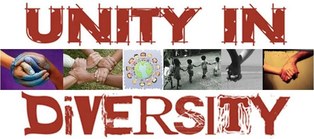
This is part of what happened at that first Christian Pentecost we heard about in our first reading today. For we are told that:
‘the crowd gathered and was bewildered, because each one heard them speaking in the native language of each... Parthjans, Medes, Elamites, and residents of Mesopotamia, Judea and Cappadocia, Pontus and Asia, Phrygia and Pamphylia, Egypt and the parts of Libya belonging to Cyrene, and visitors from Rome, both Jews and proselytes, Cretans and Arabs—in our own languages we hear them speaking about God’s deeds of power’ - not one voice, all the same, but many, many voices, speaking in so many different tones.
No wonder, the report goes on:
‘All were amazed and perplexed, saying to one another, “What does this mean?‘
There has been an in-built human tendency in history to believe that sameness is good and healthy, and difference is bad and destructive. Unity, in this way of thinking, has to mean uniformity. Some so-called ‘strong’ leaders often appeal to this instinct when they rally support by demanding that everything is ordered in such and such a way, whilst attacking and excluding others who are different. Biblically speaking, one of the greatest images of this is the Tower of Babel. That Tower was an astonishingly impressive edifice, built with the idea of reaching up and connecting to heaven. Yet what did God do with it, according to the story? God destroyed the Tower of Babel and scattered the peoples, giving them different languages. For the God of Jesus is a God of uniformity but a God of true unity which includes radical differences. As we see in that first Christian Pentecost. God seeks for us to sing in harmony not mere unison.
No doubt there are other things to say about both Pentecost and the story of Tower of Babel: about spiritual experiences and human pride for example. However, the story we hear from the Acts of the Apostles is not least surely intended to represent its opposite, revaluing our human differences as pathways through which God can work. Whereas, in the Tower of Babel, human beings try to climb up to God, at the Christian Pentecost God has not only come down to human beings, but, through the Holy Spirit, makes a dwelling place and flows out through each one of them. Whereas, in the Tower of Babel, the people of the world are scattered and divided by their different languages, cultures and life-styles, at the Christian Pentecost those very differences are transformed and become means of grace to all, bringing a much, much, deeper unity than could ever have been imagined.
What a message of hope and inspiration our Christian Pentecost should therefore be for all! In a world struggling to reconcile, and even value, our God-given human differences, our Faith encourages us to see that very human diversity as sources of grace and healing. Again, as we hear in today’s story of the first Christian Pentecost, this is the desire of God for us all. For, as Peter says, in response to those amazed by the diverse and exuberant outburst of spiritual tongues and blessings, it is not least a fulfilment of the prophecy of Joel that God’s Spirit will be poured out on all: not just upon sons but also upon daughters; not just upon the young but also upon the old; not just upon the well-born but also upon servants; indeed, Joel prophesied, ‘upon all flesh.’
So how will we share this wonderful, if challenging, promise of Pentecost? Can we too allow the Holy Spirit to speak through us? Can we encourage one another to hear God speaking to us through our extraordinary range of human differences? Can we receive this gift God offers to us and share the exuberant joy and excitement of that first Christian Pentecost? What a difference that might make to our Church and our world! In Jesus’ name, Amen.
Jo Inkpin, for Pentecost Sunday, 20 May 2018, Chapel of the Holy Spirit, Milton
 RSS Feed
RSS Feed